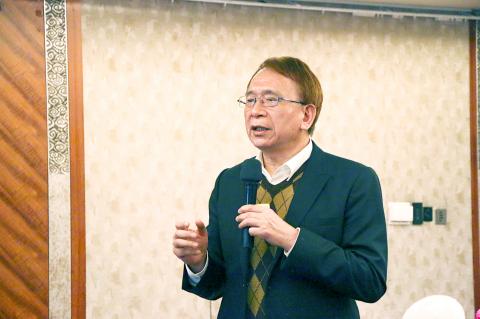Former TTY Biopharm Co (台灣東洋藥品) chairman Lin Rong-jin (林榮錦) yesterday was sentenced to 10 years in prison on charges of embezzlement — a verdict that he said he would appeal.
A year after Lin’s departure in 2014, TTY Biopharm chairman Clark Hsiao (蕭英鈞) launched a lawsuit against his predecessor alleging that he had caused the company NT$3 billion (US$99.48 million at the current exchange rate) in losses.
The Taipei District Court yesterday found Lin guilty on four counts of violations of the Securities and Exchange Act (證交法), including breach of trust and conducting abnormal transactions.

Photo: Chen Yung-chi, Taipei Times
He also has to turn in 22.89 million euros (US$27.39 million) in unlawful gains, the verdict read.
Lin was accused of in 2013 transferring a number of patents held by TTY Biopharm to Switzerland-based Inopha AG — a company that Lin controls through Center Laboratories Inc (晟德大藥廠), of which he is the chairman — along with all the rights to further develop the intellectual property.
The patents include treatments for breast and ovarian cancers, as well as fungal infections and schizophrenia, which were transferred for Lin’s personal gain at the expense of TTY BioPharm, the ruling said.
Lin said the investigation does not reflect the entirety of the case and that the accusations originated from a personal row with Hsiao, his longtime business partner.
He said that his reputation and track record in Taiwan’s biotechnology sector speaks for itself and that he trusts that the court would uncover the truth.
Lin, a notable figure in the industry who has had a hand in the founding of several Taiwanese biotechnology firms, was enlisted to restructure then-ailing TTY Biopharm in 1994.
Lin helped bring the company back into the black.
He is credited with transitioning a company focused on manufacturing and selling generic drugs to developing and marketing branded and more advanced generic drugs.

SEEKING CLARITY: Washington should not adopt measures that create uncertainties for ‘existing semiconductor investments,’ TSMC said referring to its US$165 billion in the US Taiwan Semiconductor Manufacturing Co (TSMC, 台積電) told the US that any future tariffs on Taiwanese semiconductors could reduce demand for chips and derail its pledge to increase its investment in Arizona. “New import restrictions could jeopardize current US leadership in the competitive technology industry and create uncertainties for many committed semiconductor capital projects in the US, including TSMC Arizona’s significant investment plan in Phoenix,” the chipmaker wrote in a letter to the US Department of Commerce. TSMC issued the warning in response to a solicitation for comments by the department on a possible tariff on semiconductor imports by US President Donald Trump’s

The government has launched a three-pronged strategy to attract local and international talent, aiming to position Taiwan as a new global hub following Nvidia Corp’s announcement that it has chosen Taipei as the site of its Taiwan headquarters. Nvidia cofounder and CEO Jensen Huang (黃仁勳) on Monday last week announced during his keynote speech at the Computex trade show in Taipei that the Nvidia Constellation, the company’s planned Taiwan headquarters, would be located in the Beitou-Shilin Technology Park (北投士林科技園區) in Taipei. Huang’s decision to establish a base in Taiwan is “primarily due to Taiwan’s talent pool and its strength in the semiconductor

An earnings report from semiconductor giant and artificial intelligence (AI) bellwether Nvidia Corp takes center stage for Wall Street this week, as stocks hit a speed bump of worries over US federal deficits driving up Treasury yields. US equities pulled back last week after a torrid rally, as investors turned their attention to tax and spending legislation poised to swell the US government’s US$36 trillion in debt. Long-dated US Treasury yields rose amid the fiscal worries, with the 30-year yield topping 5 percent and hitting its highest level since late 2023. Stocks were dealt another blow on Friday when US President Donald

UNCERTAINTY: Investors remain worried that trade negotiations with Washington could go poorly, given Trump’s inconsistency on tariffs in his second term, experts said The consumer confidence index this month fell for a ninth consecutive month to its lowest level in 13 months, as global trade uncertainties and tariff risks cloud Taiwan’s economic outlook, a survey released yesterday by National Central University found. The biggest decline came from the timing for stock investments, which plunged 11.82 points to 26.82, underscoring bleak investor confidence, it said. “Although the TAIEX reclaimed the 21,000-point mark after the US and China agreed to bury the hatchet for 90 days, investors remain worried that the situation would turn sour later,” said Dachrahn Wu (吳大任), director of the university’s Research Center for